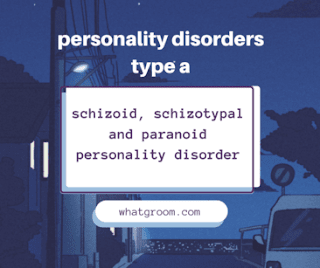Personality disorders type a are common mental health conditions that can affect how people think, feel, and behave. They can be difficult to diagnose because they involve a complex mix of emotions, behaviors, and thoughts. Let’s take a closer look at what these disorders entail. personality disorders type Cluster a are characterized by odd, eccentric thinking or behavior. They include schizoid personality disorder, schizotypal personality disorder and paranoid personality disorder.
Schizoid personality disorder
is a mental health condition that affects an individual’s ability to engage in social activities and maintain interpersonal relationships. People with schizoid personality disorder often experience difficulty expressing emotions, including happiness, sadness, anger, or fear. They may also have trouble experiencing pleasure from activities that are typically enjoyable for most people. Individuals may feel detached from others and prefer to be alone rather than seek out social interaction. Treatment for schizoid personality disorder typically involves psychotherapy, support groups, and in some cases, medication. It is important to remember that schizoid personality disorder is a treatable condition with the right help and support. By seeking treatment, people can begin to find ways of managing their schizoid personality disorder and living a fulfilled, meaningful life.
Schizotypal personality disorder
is a mental health condition that causes difficulty in social interaction and communication. People with schizotypal personality disorder tend to have reduced emotional expression, limited relationships, odd behavior or thinking, and unusual perceptual experiences. The cause of schizotypal personality disorder is unknown but it is believed to be a combination of genetic, environmental and social factors.
Symptoms of schizotypal personality disorder
include difficulty in forming or maintaining relationships, having odd beliefs about the world and other people, avoidance of close relationships, suspicion of others' intentions, lack of nonverbal communication skills (gestures and facial expressions), strange ways of speaking or dressing, inappropriate affect (emotional reactions that don't match what is expected for the situation), and frequent misinterpretations or misperceptions about events. Other symptoms may include paranoia, magical thinking (believing that one's thoughts can cause an event to happen without any other intervening forces), superstitions or exaggerated fears.
Schizotypal personality disorder is diagnosed based on a thorough evaluation by a mental health professional. The diagnosis is usually made through a clinical interview that assesses a person's symptoms and behavior, as well as any family history of mental illness or substance use. Diagnostic criteria are based on the Diagnostic and Statistical Manual of Mental Disorders (DSM-5).
Treatment for schizotypal personality disorder
typically includes psychotherapy, medication, and social support. Cognitive behavioral therapy (CBT) may be used to help individuals change their negative thinking patterns and manage stress more effectively. Medications such as antidepressants, antipsychotics, or mood stabilizers may also be prescribed to reduce symptoms such as depression or anxiety. Group therapy can provide an opportunity for people with schizotypal personality disorder to learn communication and social skills with the help of a trained therapist. It can also provide support and positive reinforcement for individuals who are struggling to cope with their symptoms. Social support from family and friends is important in helping people with schizotypal personality disorder manage their condition.
With treatment, many people with schizotypal personality disorder make strides in managing their symptoms, improving quality of life and engaging more effectively in relationships. However, it is important to note that recovery from this condition can be a long process. With patience, persistence, and appropriate resources, many individuals find that they can lead meaningful lives despite their challenges.
Schizotypal Personality Disorder
Schizotypal personality disorder is characterized by odd beliefs and behavior as well as difficulties connecting with other people emotionally. People with SPD often have difficulty expressing themselves or understanding social cues, which can lead them to withdraw from social situations and appear distant or aloof. SPD is also associated with magical thinking—the idea that thoughts or actions can influence events outside one’s control—as well as unusual perceptions such as seeing patterns in random events or believing that certain objects are imbued with special meaning.
Personality disorders can be highly disruptive to a person’s life if left untreated, but fortunately, help is available for those who need it. If you suspect that you may have a personality disorder, consulting with a mental health professional who specializes in diagnosing such conditions can help you receive an accurate diagnosis and develop a treatment plan tailored to your specific needs. With the right support system in place, living with a personality disorder does not have to be overwhelming or unmanageable; instead, it can be an opportunity for growth and self-discovery.




.jpg)

0 Comments